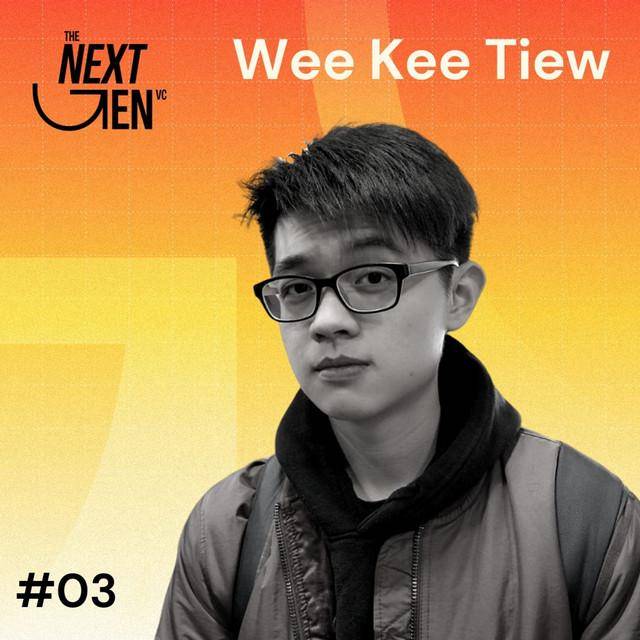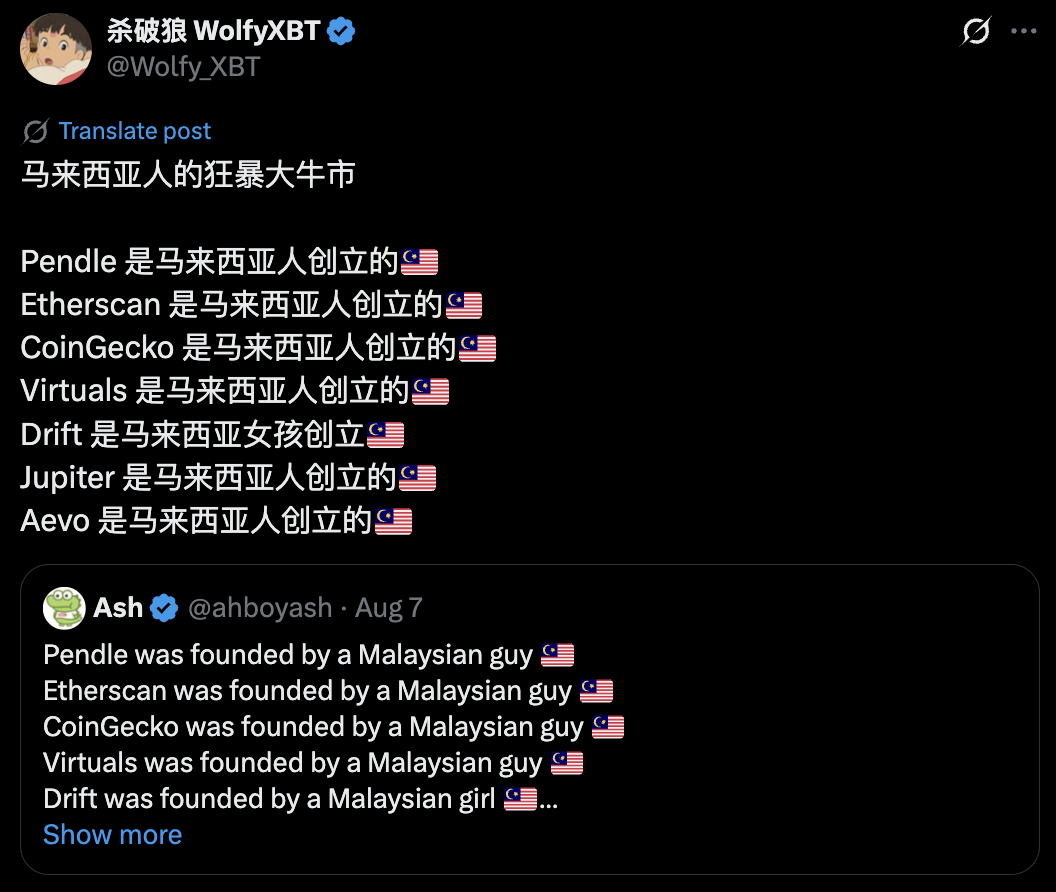Author: Yanz, June, Deep Tide TechFlow
When people talk about the main characters in the crypto world, they often think of the geeks from Silicon Valley, the capital from Wall Street, the investment institutions from Singapore and Hong Kong, and the developers from mainland China, but few look towards the Malaysian Chinese.
They haven't graced the cover of Fortune like SBF, nor have they been labeled as "the richest Chinese" like Zhao Changpeng.
They are less likely to accept spotlight interviews and often remain "invisible" on Twitter.
However, when you truly dissect the landscape of the crypto industry, you will be surprised to find:
- The world's largest crypto data platform CoinGecko was born in Kuala Lumpur;
- The indispensable Etherscan in the Ethereum ecosystem was built by Malaysian Chinese;
- The hot bull market narrative "AI + Crypto" of Virtuals Protocol also comes from a Malaysian Chinese team.
- The liquidity center of the Solana ecosystem, Jupiter, is from Malaysia.
These projects are not just replaceable scraps; they have become the infrastructure of the crypto industry and the sparks of new narratives.
Without the Malaysian Chinese, today's crypto industry would lose a pair of "eyes," a "map," and even a future "path of exploration."
Builders
In 2014, Mt. Gox collapsed, plunging the entire crypto world into darkness. At the most chaotic moment in the market, Bobby Ong and TM Lee used $100 as startup capital to establish CoinGecko.

One studied economics, and the other was a programmer. They met by chance but shared the same judgment: the market urgently needed a transparent and reliable data platform. Thus, CoinGecko was born amidst the market crisis.
"We wanted to create a company that could serve everyone in the world," they summarized their original intention years later. The facts have proven this direction to be correct. With the Trust Score algorithm and coverage of niche markets, CoinGecko quickly became an essential tool for investors. Ten years later, it has recorded over 17,000 tokens, and its API is widely used by Trezor, Metamask, and others.
Around the same time, another young Malaysian, Matthew Tan, was focusing on Ethereum. He had operated a blockchain search engine called Blockscan. When Ethereum smart contracts emerged, he keenly identified a critical issue that almost everyone overlooked: the existing block explorers could only handle simple peer-to-peer transactions and were completely unable to cope with the complexities brought by smart contracts.
Thus, he almost risked everything to transform Blockscan into Etherscan.
"This is no longer a value transfer from point A to point B. There are too many things that need to be displayed by a search engine."
He decisively upgraded the early blockchain search engine Blockscan, which had been operating for two years, into Etherscan, redesigning the underlying architecture specifically for the complexities of smart contracts.
Today, Etherscan has evolved from a simple tool into the de facto standard of the Ethereum ecosystem, with almost every Ethereum user relying on it. With the advent of the multi-chain era, the subsequent launch of products like BscScan, PolygonScan, and ArbiScan has further solidified this Malaysian Chinese's dominant position in the blockchain explorer field.
Fast forward to 2021. As the summer of DeFi lingered, a young man named TN Lee focused on a more complex problem: how to make yields more predictable and tradable?
With a background in computer science and a deep understanding of financial derivatives logic, he proposed a concept that seemed crazy at the time: yield tokenization. He separated future yields into principal tokens (PT) and yield tokens (YT), allowing users to trade these two parts independently.
What seemed like a simple innovation actually took years, and in 2021, Pendle Protocol was born.
Also in 2021, young developer Siong turned his attention to Solana. He saw the potential of high performance but also the challenges of fragmented liquidity and excessive slippage. Thus, he and his team created Jupiter, a trading aggregator that automatically finds the optimal path through smart routing algorithms.
Starting from obscurity, by 2024, Pendle and Jupiter both achieved success in their respective ecosystems. Pendle became a leading protocol in the DeFi space with a total locked value (TVL) exceeding $10 billion, while Jupiter became the liquidity center of the Solana ecosystem, with daily trading volumes often exceeding $1 billion and a total token market cap once surpassing $10 billion.
The entrepreneurial story does not end here. In 2024, Weekee Tiew, who had worked at Boston Consulting Group, turned his attention to AI. He had founded a gaming guild, PathDAO, valued at $600 million, but after it fell to the bottom during the bear market, he struggled to find a way forward. In 2024, he pivoted to launch Virtuals Protocol, focusing on the creation and issuance of AI agents.

The token of Virtuals Protocol, $VIRTUAL, reached a new market cap high of over $4.5 billion in January 2025, becoming one of the most representative projects in the intersection of AI and Crypto.
It wasn't until "the sudden rise" that Weekee Tiew appeared on numerous podcast shows, and everyone was surprised to discover that this was a Malaysian project.
Not only that, but Pendle, Jupiter, Aevo, and Drift also all come from Malaysia.

On Twitter, there seems to be a consensus that this cycle belongs to the entrepreneurial bull market of the Malaysians.
Bridge Builders
"I have many Malaysian friends who don't say much on social media."
Compared to well-known entrepreneurs, many Malaysian Chinese in the crypto industry are like veins, dispersed throughout the industry, connecting flexible limbs, and their roles are akin to meridians, linking markets with different cultural backgrounds.
Malaysian Chinese are natural bridge builders.
Cova, a Malaysian Chinese who has been involved in the crypto industry for five years, realized her unique advantages in the industry as she increased her interactions with practitioners from around the world.
"I think Malaysian Chinese are born customer service representatives. Normally, a Malaysian Chinese can speak at least three languages without dialects—Chinese, Malay, and English, and some even add Japanese and Korean."
From kindergarten, they live in an environment interwoven with Chinese, English, and Malay, combined with each person's different background, plus Cantonese, Teochew, Hakka… This "multithreading" language ability allows them to thrive in teams—keeping up with trends in Europe and America, catering to the Southeast Asian market, collaborating with international teams, and connecting with clients from various countries.
This linguistic talent is particularly valuable in the crypto world. Weekee Tiew, founder of Virtuals Protocol, can showcase how Virtuals truly integrates AI with Crypto to European and American audiences on English podcasts, while also directly sharing the grand vision of Virtuals with Chinese users at offline events. This multilingual ability enables him to serve developer communities from different cultural backgrounds simultaneously.
At the intersection of cultures, Cova also believes that Malaysian Chinese and Singaporeans integrate more quickly.
"For example, projects promoted by the U.S. or their meme culture, as well as the cultures of some relatively niche countries, Malaysian Chinese and Singaporeans can integrate and understand particularly quickly."
The cultural DNA of Malaysian Chinese seems like a universal key, opening the door to multiple international markets.
However, this unique multilingual advantage also brings an unexpected side effect: the blurring of identity.
Whenever Malaysian Chinese operate their Twitter accounts or establish crypto projects, they face a crucial choice: should they use English or Chinese as the primary medium of communication? This choice often determines the audience and market they can reach.
A typical example is that if not specifically stated, it may be hard to guess that the well-known Chinese KOL Shapolang (@Wolfy_XBT) is actually Malaysian Chinese. Similarly, well-known English KOLs @ahboyash and @sandraaleow also come from Malaysia.
More critically, to gain broader recognition and acceptance in the global market, many Malaysian Chinese entrepreneurs intentionally or unintentionally downplay their regional labels. They hope their products will be seen as "international" solutions rather than projects from a specific country.
This strategy is often wise in business but leads to a regrettable outcome: most users are unaware that these world-changing products actually come from Malaysia.
When you use Etherscan to query Ethereum transactions, you might not think that this is the work of a Malaysian Chinese team; when you trade tokens on Jupiter or study Pendle's yield strategies, you might be more inclined to think this is the masterpiece of some elite team from Europe or America.
Their "invisible" identity precisely illustrates the adaptability of Malaysian Chinese in a globalized context, but it also reflects their complex situation regarding identity recognition and market positioning.
Behind this blurring of identity lies a deeper issue: talent outflow.
Many Malaysian Chinese choose to leave their hometowns to achieve their ambitions. This fertile land continues to cultivate batch after batch of talent, but due to various practical factors, whether it be the policy environment, market scale, or degree of internationalization, these talents are often forced to flow to overseas markets.
They shine on the global stage, yet few know their true origins. This "invisible success" illustrates the adaptability of Malaysian Chinese in a globalized context and is also the price this group pays in the process of globalization.
They are the best bridge builders but also the builders whose identities are most easily forgotten.
Change Makers
Serious, pragmatic, and content, these are the common traits of most Malaysian Chinese. They rarely boast about their achievements on social media and prefer to let their solid work results speak for themselves.
This low-key approach to work is deeply connected to their historical experiences.
During the late Qing Dynasty's "down south" immigration wave, Chinese people migrated from the southeastern coastal regions of China to the Malay Peninsula. Faced with a completely unfamiliar environment and culture, they could only rely on hard work and wisdom to find a space for survival within the British colonial economic system. However, even after achieving success in business through effort, the colonial government's "divide and rule" policy consistently excluded the Chinese from political power.
After Malaysia gained independence in 1957, the political ideology of "Malay supremacy" and the subsequent implementation of the New Economic Policy further restricted the development opportunities for the Chinese in education, employment, and business through a quota system. University admission quotas were limited, government job positions had thresholds, and even starting a business faced various policy barriers.
This long-term systemic pressure shaped the unique survival philosophy of Malaysian Chinese: since they could not change the larger environment, they focused on doing well in what they could control. They learned to survive in the cracks, to prove their worth through strength, and to maintain resilience in adversity.
"Malaysian Chinese have always been suppressed by policies, so most people are just working hard underwater, as long as they can make money."
The resilience cultivated from this historical experience has become a unique advantage in the challenging crypto industry. When the market crashes, they do not panic; when projects encounter difficulties, they find ways to solve problems instead of complaining; when opportunities arise, they quietly seize them rather than boasting…
However, focusing on work, profiting while pursuing dreams, and proving their strength through project success to change the inherent impressions of the Malaysian Chinese community is not a smooth process.
The early reputation of Malaysian crypto projects was not optimistic, with many projects suspected of manipulating the market and operating pyramid schemes. A more intuitive example is that Cova mentioned Malaysian Chinese are often pre-judged by partners as "project operators," and this bias creates additional trust costs in establishing business.
The formation of this negative impression has historical roots.
The lack of early financial technology regulation in Malaysia indeed created many gray areas, with some criminals exploiting regulatory gaps for illegal fundraising and fraud activities. Many projects claiming to be "blockchain innovations" have repeatedly exploited investors, harming their interests and casting a shadow over the entire Malaysian tech startup ecosystem.
Worse still, these negative cases often spread faster and wider than positive stories. When people hear "Malaysian project," their first reaction may not be technological innovation, but rather "be careful of being scammed." This stereotype has become an invisible barrier that all Malaysian Chinese entrepreneurs must face.
But times are changing. The global success of projects like CoinGecko, Etherscan, Pendle, Jupiter, and Virtuals Protocol is bringing quality Malaysian projects into the spotlight on the international stage, gradually improving global users' perceptions of Malaysian tech projects.
"I think these down-to-earth builders are proving themselves in these two or three bull markets, showing they are not the project operators playing pyramid games as per stereotypes, but rather large projects that are international from the outset," said a Malaysian Chinese practitioner.
Crossing cycles, this shadow army has always been doing its own thing in the industry. Building, bridging, realizing dreams… until they are seen, until they are recognized, or "as long as they can make money."
免责声明:本文章仅代表作者个人观点,不代表本平台的立场和观点。本文章仅供信息分享,不构成对任何人的任何投资建议。用户与作者之间的任何争议,与本平台无关。如网页中刊载的文章或图片涉及侵权,请提供相关的权利证明和身份证明发送邮件到support@aicoin.com,本平台相关工作人员将会进行核查。




